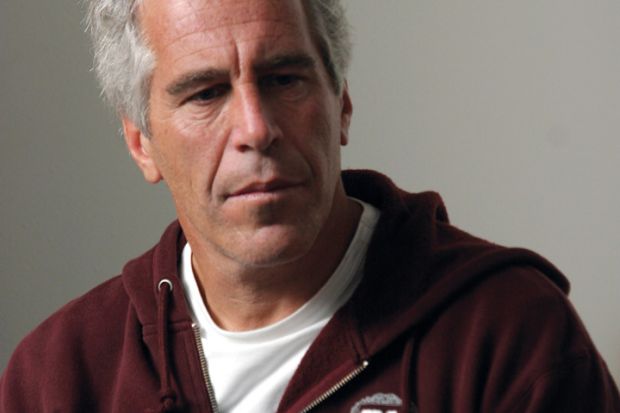Several US universities are facing questions over why they failed to stop their academics taking research funding from Jeffrey Epstein even after the financier was convicted of soliciting prostitution from an underage girl.
Since his death in prison on 10 August while awaiting trial for alleged sex trafficking of minors, attention has focused on Epstein’s relationships with and funding of prominent scientists.
Critics argue that the scandal points to the ineffectiveness of universities’ control over their academics’ fundraising efforts, and raises wider concerns over how they handle ultra-wealthy people who seek to shape the scientific agenda.
“There’s absolutely no circumstances where an individual academic or a lab group would be able to do any of this without the university’s blessing and ethical approval,” said Christopher Davidson, an expert on Gulf monarchies at the European Centre for International Affairs, who has commented extensively on the ethics of university donations.
“In my experience it doesn’t and shouldn’t make any difference” whether a philanthropist gives to an institution, or a particular academic or lab, said Dr Davidson. “Almost all UK and US universities don’t make that distinction. Funding is funding,” he added.
Two researchers at the Massachusetts Institute of Technology have admitted that they met and took money from Epstein after his conviction in 2008, one even visiting him during his prison term in Florida. The donations have triggered two resignations in protest at MIT’s Media Lab.
In response, MIT president Rafael Reif acknowledged in a public letter that “decisions about gifts are always subject to long-standing institute processes and principles. To my great regret, despite following the processes that have served MIT well for many years, in this instance we made a mistake of judgement.” MIT did not respond when asked by Times Higher Education whether this meant that it had internally approved Epstein’s post-conviction gifts.
Attention has also focused on physicist Lawrence Krauss, who, according to a Buzzfeed investigation, received at least $250,000 (£205,000) from Epstein to fund the Origins Project at Arizona State University. The project brought together scientists and celebrities, with the last payment reportedly in 2017. In 2011, the university’s press office publicised a debate involving Professor Krauss and other prominent scientists, held “in partnership” with the “J. Epstein Foundation”.
Arizona State did not respond to a THE query about its vetting of the donation, nor did Professor Krauss, who retired from the university last year following sexual misconduct allegations.
“Many universities do have ethics boards in place,” said Nathan Oseroff, a philosophy of science postgraduate at King’s College London who investigated Epstein’s relationships with academia. “Either they didn’t follow the appropriate policies in places, or they didn’t extend that far to cover the donor [Epstein].”
“The main takeaway is that even if robust ethics frameworks are in place, they can be bent around...if the price is right,” added Dr Davidson.
Other aspects of Epstein’s agenda raise questions over the appropriateness of donations accepted even before his conviction in 2008. The New York Times has reported how Epstein maintained an interest in eugenics, and from the early 2000s boasted of plans to inseminate dozens of women on his New Mexico ranch.
“A donor also interested in eugenics should raise all sorts of flags – whether or not they connect this interest to what they fund. This should have ruled him out as a donor,” said Jonathan Eisen, an evolutionary biologist at University of California, Davis, and critic of institutions that took money from Epstein.
One way to counteract the intellectual influence of wealthy donors such as Epstein over the research agenda was to anonymise where money has come from, argued Mr Oseroff, so that researchers were not unconsciously influenced by the donor’s expectations. “People can read into these donations what is expected of them,” he said.
But this comes with its own problems. In 2017, Epstein made a $50,000 anonymised donation to the University of Arizona’s Center for Consciousness Studies, the Daily Beast revealed in April. Arizona did not reply to a THE request for comment.
Anonymisation might shield researchers from donor influence, but it means that the wealthy are potentially able to buy secret, unaccountable leverage over universities, said Mr Oseroff.
Ultimately, the scandal around Epstein’s funding of research is just one part of the “bigger issue” of declining public funding, he said, which forced academia to rely on companies and rich individuals with their own agendas.
Still, scientists courted by Epstein were largely secure in their careers, while some of his beneficiaries were among the richest institutions in the world, including Harvard University, which has “no plans” to return Epstein’s 2003 $6.5 million donation to fund research into evolutionary dynamics, USA Today reported in July. Harvard did not reply to THE questions about donations from Epstein.
Register to continue
Why register?
- Registration is free and only takes a moment
- Once registered, you can read 3 articles a month
- Sign up for our newsletter
Subscribe
Or subscribe for unlimited access to:
- Unlimited access to news, views, insights & reviews
- Digital editions
- Digital access to THE’s university and college rankings analysis
Already registered or a current subscriber? Login








